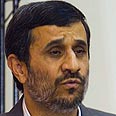

Three attacks on developing nuclear centers have occurred in the world, the most recent scant months ago. It is amazing that the year 2010, pegged universally as crunch time regarding Iran's atomic ambitions, ended with such a whimper, not a bang. It was to be a year characterized ultimately by a crippling counter-blow to Teheran's plans -with nary a peep from the media. No "top 10 stories of 2010" inclusions. Not even a Wiki-leak.
On June 7, 1981 Israeli Prime Minister Menachem Begin ordered his air force to destroy Saddam Hussein's Osirak nuclear site in Iraq. As the world twiddled its thumbs and tut-tutted, Israel took out this metastasizing growth. The UN Security Council, including America's vote, condemned the attack 12 days later. As recently as a few months ago, calls for compensation to be paid by Israel to Iraq were still being voiced.
Just three years ago, on September 6, the Syrian nuke site at Deir Ez Zor, a shill for North Korea, was leveled. Both the IAEA and CIA had concluded the site was heading toward military functionality. Eight "unidentified" aircraft carried out the mission, which included clandestine scouts on the ground. The bombers used Turkish airspace, tacitly approved as a result of Ankara's deep concerns over budding Syrian nuclearization. Brigadier General Mohammed Suleiman, President Assad's go-to-guy with North Korea and Iran was subsequently - as if for good measure - shot dead by an unnamed sniper while on vacation on August 2, 2008.
Although then-Secretary of State Condoleezza Rice confirmed (a Wiki revelation) that Israel had rather unsurprisingly mounted the attack, no UN condemnations followed, this from an international body never shy to hurl hostile pronunciamentos in Jerusalem's direction. With supreme irony, the Syrians were too embarrassed to make much of a to-do, and Israel clearly preferred to keep it quiet.
Most amazing of all, the third attack was "silent but not subtle" as one analyst observed. Stuxnet. Even the name discourages casual conversation. Try saying it five times, fast. Perhaps the most sophisticated, complex worm virus ever designed (massively comprised of 15,000 lines of code) invaded the rapidly developing computer control systems of Iran's atomic facilities. Analysts ascribed the capability to develop this level of malware to a small circle of candidates: the US, Britain, Israel.
Washington's Institute for Science and International Security concluded that Stuxnet infected as many as 30,000 institutional computers involved in the project and outright broke 1,000 Iranian IR-1 centrifuges at the Natanz uranium enrichment facility, prompting a rare understatement from President Ahmadinejad citing technical problems as the cause for a temporary shutdown of the plant.
World security experts opined that Stuxnet was "amazing" and "groundbreaking," even a "prime example of clandestine digital warfare." Most concurred that basement hackers would not be likely sources of the malware, which required tremendous time, brainpower and government-level resources to create.
Nobel Peace Prize for Stuxnet
Whodunnit? Curiously, even though many suspected Israel, global reactions were relatively muted. Some pointed to the IDF's Military Intelligence Unit 8200, concentrating dozens of brainy Israel's most precocious geeks under one roof. President Obama also ordered the creation in the US of a new military unit called Cyber Command, headed by General Keith Alexander. No one is perfect, but the new American unit failed spectacularly to prevent the mass Wiki-pilferage that recently rocked the world.
Some point to two deeply imbedded Stuxnet file names, myrtus and guava, interpreted as a not so subtle allusion to the Bible's Esther story. Her Hebrew name was myrtle, in the guava family, and of course she saved her people the Jews…from imminent annihilation in ancient Iran. Then again, it might have been a red herring.
If the malwarfare were not enough, an outright panic assault on Iran's atomic scientists was also an integral part of the campaign. As recently as November 29, 2010, quantum physicist Majid Shahriari was eliminated in Tehran and colleague Fereydoun Abbasi was seriously injured in another assassination attempt across town.
Previously, quantum theorist Massoud Alimohammadi was killed in a similar attack and Ardeshir Hosseinpour, an authority on electromagnetism, died mysteriously in 2007 during his nuclear work at Isfahan. The four targets were themselves valuable assets, but clearly the more important accomplishment was to cause the next 5,000 people engaged in weaponizing Iran to shiver and perhaps think twice about their career path. Death was delivered not by drone in these cases but simply by exploding motorbikes next to the scientists' respective cars.
As monumentally significant as the strategic ramifications of Stuxnet are, the universal lack of media coverage of this new phase of cyberwar was nothing less than stunning. Whereas the Osirak operation commanded page one attention everywhere for a lengthy news cycle, the latter two initiatives attracted less press interest than a devastating flood might in Upper Volta.
A key lesson has clearly been learned: Attack effectively and keep quiet. A cursory Google news scan turned up only 30 references to Osirak which is of course more history than news in 2011. But key word searches for the Syrian episode revealed only 131 news references, and Stuxnet barely cleared the 1,000 hurdle. Contrasted to Justin Bieber announcing his upcoming performance in Israel, these tiny numbers border somewhere between negligible and non-existent.
The temporary derailment of Iran's atomic program is the greatest news story NOT reported on in 2010, made possible by the world media's fierce indifference to this defeat by malware. Meanwhile, the West can sleep just a little better tonight as a result, comforted by the amazing results that transcended tepid international sanctions…results secured by a smart and civic minded Lone Ranger who might be considered for the next Nobel Peace Prize. But nobody for sure knows who that quiet masked man was. Or what he did. Or why he did it.
Charley J. Levine is a media relations and public affairs specialist living in Jerusalem
- Follow Ynetnews on Facebook















